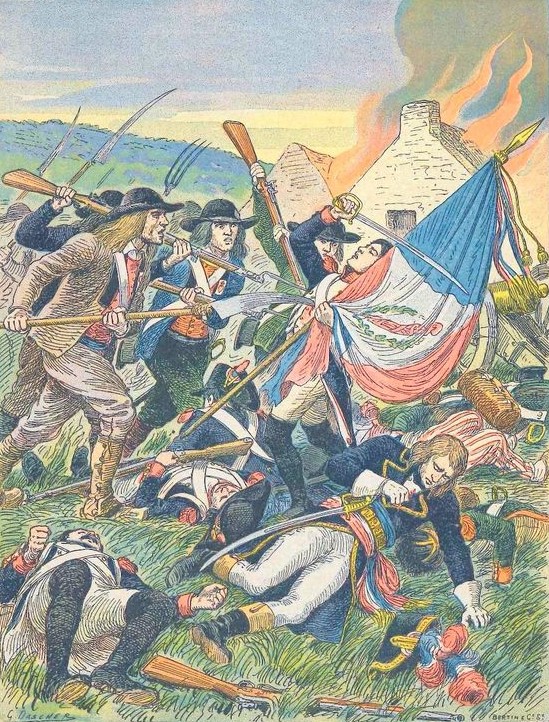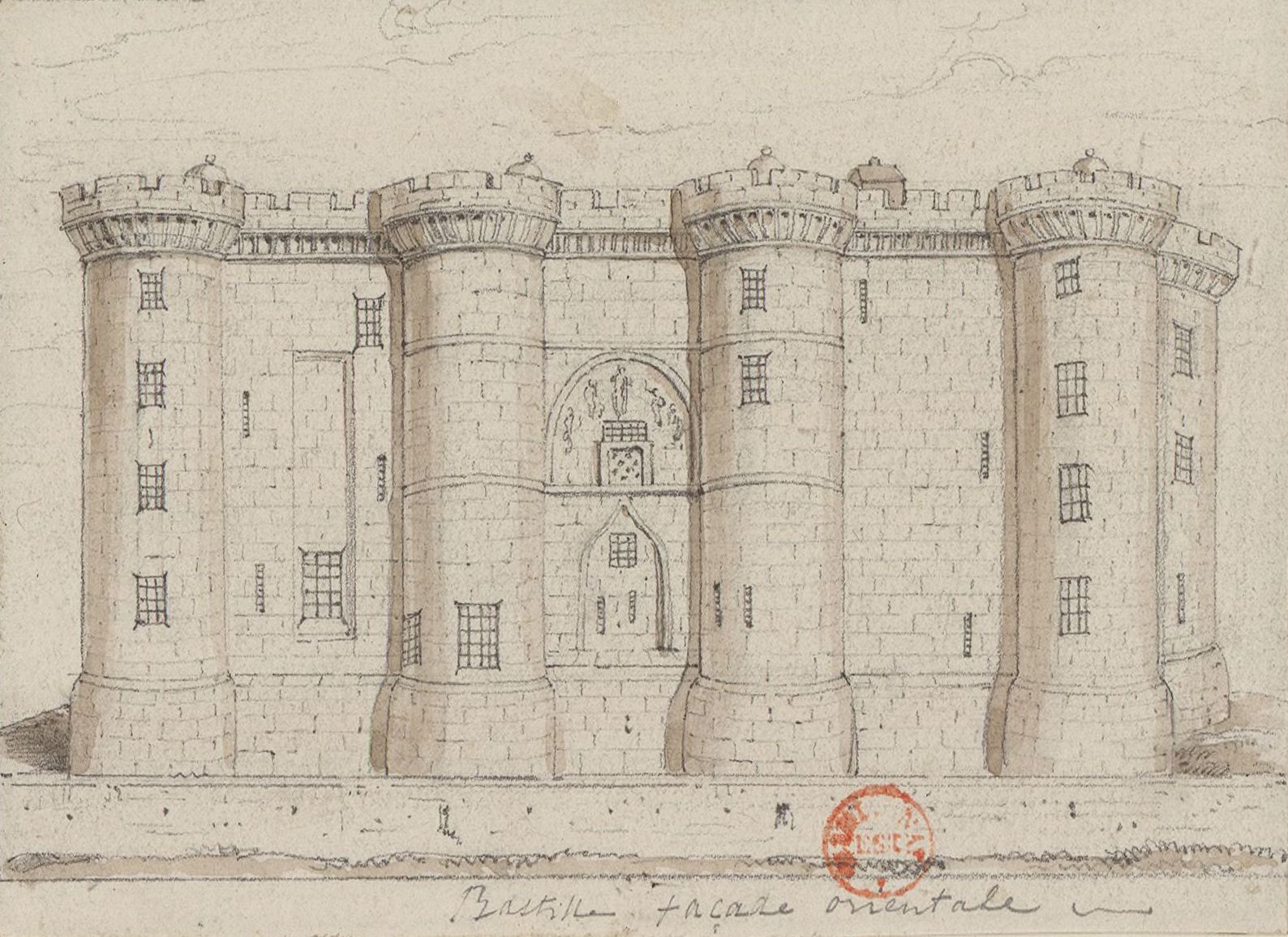|
Enragés
The Enragés (; ), commonly known as the Ultra-radicals (), were a small number of firebrands known for defending the lower class and expressing the demands of the radical ''sans-culottes'' during the French Revolution.Jeremy D. Popkin (2015). ''A Short History of the French Revolution''. Hoboken, NJ: Pearson Education, Inc. p. 68. They played an active role in the 31 May – 2 June 1793 Paris uprisings that forced the expulsion of the Girondins from the National Convention, allowing the Montagnards to assume full control. The Enragés gained their name for their angry rhetoric appealing to the National Convention to take more measures that would benefit the poor. Jacques Roux, Jean-François Varlet, Jean Théophile Victor Leclerc and Claire Lacombe, the primary leaders of the Enragés, were strident critics of the National Convention for failing to carry out the promises of the French Revolution. The Enragés were not a unified party, but rather a set of individuals who wor ... [...More Info...] [...Related Items...] OR: [Wikipedia] [Google] [Baidu] |
Claire Lacombe
Claire Lacombe (4 August 1765 – 2 May 1826) was a French actress and revolutionary. She is best known for her contributions during the French Revolution. Though it was only for a few years, Lacombe was a revolutionary and a founding member of the Society of Revolutionary Republican Women. Early life Lacombe was born in the provincial town of Pamiers in southwestern France. She became an actress at a young age and appeared in theatrical productions in the provinces before arriving in Paris in 1792. She was not an outstanding success in the theater, and she was not entirely happy with her life. The acting company that Lacombe worked for moved from town to town and sometimes went to castles and the country houses of aristocrats. This probably had an influence in her decision to quit the company to become a revolutionary. Revolutionary career In Paris during the insurrection of 10 August 1792, Lacombe fought with the rebels during the storming of the Tuileries. She was shot t ... [...More Info...] [...Related Items...] OR: [Wikipedia] [Google] [Baidu] |
Jean Théophile Victor Leclerc
Jean Théophile Victor Leclerc (), a.k.a. Jean-Theophilus Leclerc and Theophilus Leclerc d'Oze (1771–1820), was a radical French revolutionary, publicist, and soldier. After Jean-Paul Marat was assassinated, Leclerc assumed his mantle. Leclerc was the son of a civil engineer and joined the National Guard in Clermont-Ferrand at the outbreak of revolution in 1789. He then went to Martinique as a merchant's agent. However, his militant pro-revolutionary stance brought him into conflict with the planter aristocracy, who soon expelled him for revolutionary propaganda in 1791. He returned to metropolitan France and joined the 1st battalion of Morbihan in which he served until February 1792, when he left for Paris to defend seventeen grenadiers accused, in Martinique, of being revolutionaries. He successfully defended them in front of the Jacobin Club and the revolutionary national assembly. On April first that year he made a speech before the Jacobin Club calling for the execution ... [...More Info...] [...Related Items...] OR: [Wikipedia] [Google] [Baidu] |
Sans-culottes
The (; ) were the working class, common people of the social class in France, lower classes in late 18th-century history of France, France, a great many of whom became radical and militant partisans of the French Revolution in response to their French Revolution#Causes, poor quality of life under the . The word , which is opposed to "aristocrat", seems to have been used for the first time on 28 February 1791 by Jean-Bernard Gauthier de Murnan in a derogatory sense, speaking about a " army". The word came into vogue during the demonstration of 20 June 1792. The name refers to their clothing, and through that to their lower-class status: were the fashionable silk Breeches, knee-breeches of the 18th-century French nobility, nobility and Bourgeoisie#In France and French-speaking countries, bourgeoisie, and the working class wore Trousers#Modern Europe, ''pantaloons'', or long trousers, instead.Chisholm, Hugh (1911). "Sans-culottes". ''Encyclopædia Britannica'' (11th ed.), 1911. ... [...More Info...] [...Related Items...] OR: [Wikipedia] [Google] [Baidu] |
National Convention
The National Convention () was the constituent assembly of the Kingdom of France for one day and the French First Republic for its first three years during the French Revolution, following the two-year National Constituent Assembly and the one-year Legislative Assembly. Created after the great insurrection of 10 August 1792, it was the first French government organized as a republic, abandoning the monarchy altogether. The Convention sat as a single-chamber assembly from 20 September 1792 to 26 October 1795 (4 Brumaire IV under the Convention's adopted calendar). The Convention came about when the Legislative Assembly decreed the provisional suspension of King Louis XVI and the convocation of a National Convention to draw up a new constitution with no monarchy. The other major innovation was to decree that deputies to that Convention should be elected by all Frenchmen 21 years old or more, domiciled for a year and living by the product of their labor. The National Convent ... [...More Info...] [...Related Items...] OR: [Wikipedia] [Google] [Baidu] |
Counterrevolutionary
A counter-revolutionary or an anti-revolutionary is anyone who opposes or resists a revolution, particularly one who acts after a revolution has occurred, in order to try to overturn it or reverse its course, in full or in part. The adjective "counter-revolutionary" pertains to movements that would restore the state of affairs, or the principles, that prevailed during a pre-revolutionary era. Definition A counter-revolution is opposition or resistance to a revolutionary movement. It can refer to attempts to defeat a revolutionary movement before it takes power, as well as attempts to restore the old regime after a successful revolution. Europe France The word "counter-revolutionary" originally referred to thinkers who opposed themselves to the 1789 French Revolution, such as Joseph de Maistre, Louis de Bonald or, later, Charles Maurras, the founder of the ''Action Française'' monarchist movement. More recently, it has been used in France to describe political movements t ... [...More Info...] [...Related Items...] OR: [Wikipedia] [Google] [Baidu] |
Jacobin
The Society of the Friends of the Constitution (), renamed the Society of the Jacobins, Friends of Freedom and Equality () after 1792 and commonly known as the Jacobin Club () or simply the Jacobins (; ), was the most influential political club during the French Revolution of 1789. The period of its political ascendancy includes the Reign of Terror, during which well over 10,000 people were put on trial and executed in France, many for " political crimes". Initially founded in 1789 by anti-royalist deputies from Brittany, the club grew into a nationwide republican movement with a membership estimated at a half million or more. The Jacobin Club was heterogeneous and included both prominent parliamentary factions of the early 1790s: The Mountain and the Girondins. In 1792–93, the Girondins were more prominent in leading France when they declared war on Austria and on Prussia, overthrew King Louis XVI, and set up the French First Republic. In May 1793, the leaders of th ... [...More Info...] [...Related Items...] OR: [Wikipedia] [Google] [Baidu] |
Price Controls
Price controls are restrictions set in place and enforced by governments, on the prices that can be charged for goods and services in a market. The intent behind implementing such controls can stem from the desire to maintain affordability of goods even during shortages, and to slow inflation, or alternatively to ensure a minimum income for providers of certain goods or to try to achieve a living wage. There are two primary forms of price control: a price ceiling, the maximum price that can be charged; and a price floor, the minimum price that can be charged. A well-known example of a price ceiling is Rent regulation, rent control, which limits the increases that a landlord is permitted by government to charge for rent. A widely used price floor is minimum wage (wages are the price of labor). Historically, price controls have often been imposed as part of a larger incomes policy package also employing wage controls and other regulatory elements. Although price controls are routin ... [...More Info...] [...Related Items...] OR: [Wikipedia] [Google] [Baidu] |
Speculation
In finance, speculation is the purchase of an asset (a commodity, good (economics), goods, or real estate) with the hope that it will become more valuable in a brief amount of time. It can also refer to short sales in which the speculator hopes for a decline in value. Many speculators pay little attention to the fundamental value of a security and instead focus purely on price movements. In principle, speculation can involve any tradable good or financial instrument. Speculators are particularly common in the markets for stocks, bond (finance), bonds, commodity futures, currency, currencies, cryptocurrency, fine art, collectibles, real estate, and derivative (finance), financial derivatives. Speculators play one of four primary roles in financial markets, along with hedge (finance), hedgers, who engage in transactions to offset some other pre-existing risk, arbitrageurs who seek to profit from situations where Fungibility, fungible instruments trade at different prices in dif ... [...More Info...] [...Related Items...] OR: [Wikipedia] [Google] [Baidu] |
Monopoly
A monopoly (from Greek language, Greek and ) is a market in which one person or company is the only supplier of a particular good or service. A monopoly is characterized by a lack of economic Competition (economics), competition to produce a particular thing, a lack of viable substitute goods, and the possibility of a high monopoly price well above the seller's marginal cost that leads to a high monopoly profit. The verb ''monopolise'' or ''monopolize'' refers to the ''process'' by which a company gains the ability to raise prices or exclude competitors. In economics, a monopoly is a single seller. In law, a monopoly is a business entity that has significant market power, that is, the power to charge Monopoly price, overly high prices, which is associated with unfair price raises. Although monopolies may be big businesses, size is not a characteristic of a monopoly. A small business may still have the power to raise prices in a small industry (or market). A monopoly may als ... [...More Info...] [...Related Items...] OR: [Wikipedia] [Google] [Baidu] |
Jacques Roux
Jacques Roux (; 21 August 1752 – 10 February 1794) was a radical Roman Catholic Red priest who took an active role in politics during the French Revolution. He skillfully expounded the ideals of popular democracy and classless society to crowds of Parisian sans-culottes, working class wage earners and shopkeepers, radicalizing them into a revolutionary force. He became a leader of a popular far-left. Radical revolutionary In 1791 Roux was elected to the Paris Commune. When the French First Republic started in 1792, Roux became aligned with the political faction dubbed by their enemies as the Enragés (French for "The Enraged Ones" but also "Madmen"). He was considered the most extreme spokesman on the left for the interests of the Parisian ''sans-culottes''. Roux consistently fought for an economically equal society, turning the crowds of ''sans-culottes'' against the bourgeois torpor of the Jacobins. He demanded that food be made available to every member of society, ... [...More Info...] [...Related Items...] OR: [Wikipedia] [Google] [Baidu] |
Bastille
The Bastille (, ) was a fortress in Paris, known as the Bastille Saint-Antoine. It played an important role in the internal conflicts of France and for most of its history was used as a state prison by the kings of France. It was stormed by a crowd on 14 July 1789, in the French Revolution, becoming an important symbol for the French Republican movement. It was later demolished and replaced by the Place de la Bastille. The castle was built to defend the eastern approach to the city from potential English attacks during the Hundred Years' War. Construction was underway by 1357, but the main construction occurred from 1370 onwards, creating a strong fortress with eight towers that protected the strategic gateway of the Porte Saint-Antoine heading out to the east. The innovative design proved influential in both France and England and was widely copied. The Bastille figured prominently in France's domestic conflicts, including the fighting between the rival factions of the Bur ... [...More Info...] [...Related Items...] OR: [Wikipedia] [Google] [Baidu] |
Jacobins
The Society of the Friends of the Constitution (), renamed the Society of the Jacobins, Friends of Freedom and Equality () after 1792 and commonly known as the Jacobin Club () or simply the Jacobins (; ), was the most influential List of political groups in the French Revolution, political club during the French Revolution of 1789. The period of its political ascendancy includes the Reign of Terror, during which well over 10,000 people were put on trial and executed in France, many for "political crimes". Initially founded in 1789 by Criticism of monarchy, anti-royalist deputies from Duchy of Brittany, Brittany, the club grew into a nationwide Republicanism, republican movement with a membership estimated at a half million or more. The Jacobin Club was heterogeneous and included both prominent parliamentary factions of the early 1790s: The Mountain and the Girondins. In 1792–93, the Girondins were more prominent in leading France when they French Revolutionary Wars, declared ... [...More Info...] [...Related Items...] OR: [Wikipedia] [Google] [Baidu] |







